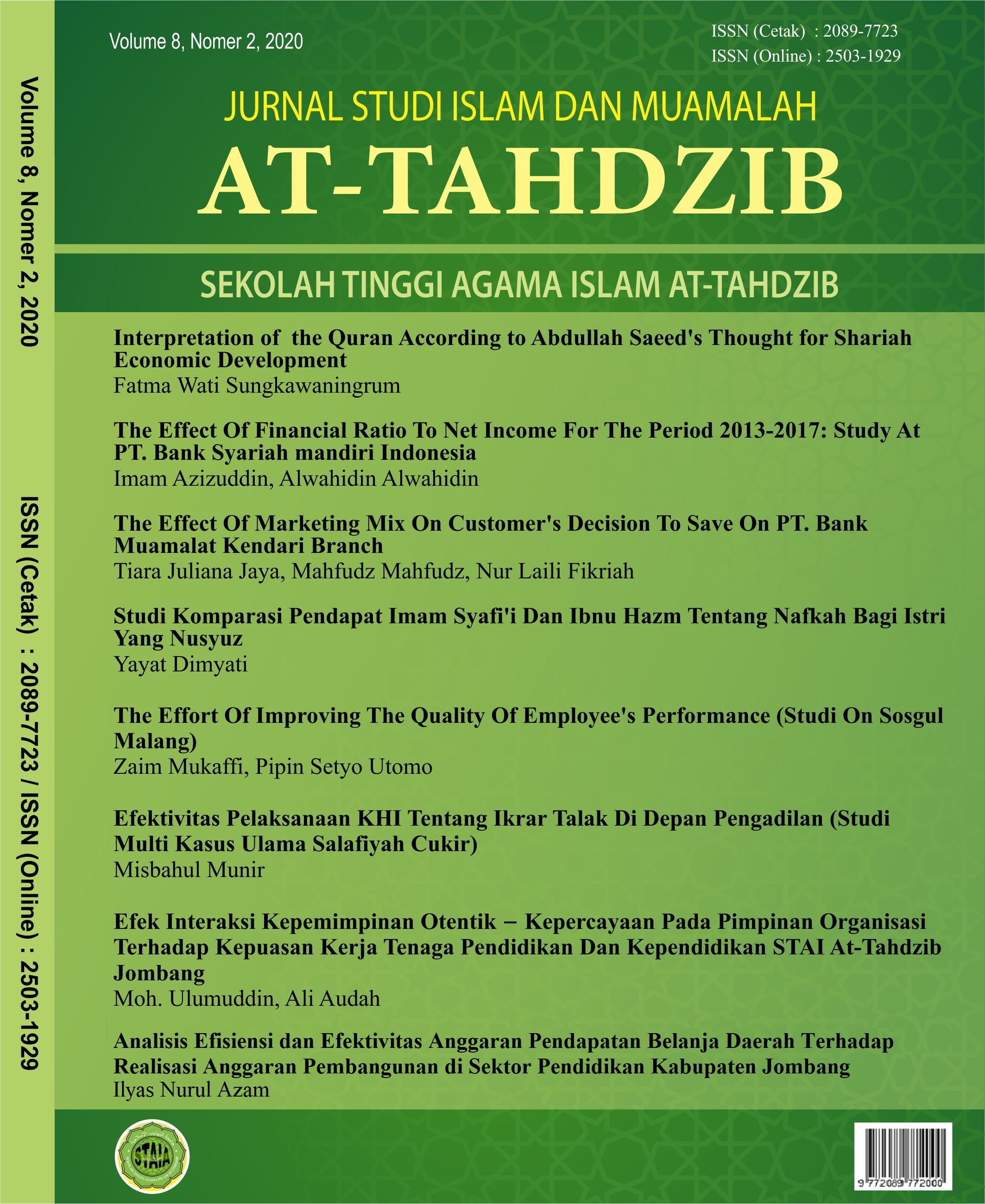Efektivitas Pelaksanaan KHI Tentang Ikrar Talak Di Depan Pengadilan (Studi Multi Kasus Ulama Salafiyah Cukir)
Abstract
Basically, the right to drop the divorce is in the hands of the husband, but as the leader of the husband's household it is not justified to commit violence against the wife, especially in terms of the wife's mentality because according to Islamic Fiqh, if the husband has dropped the word talak against the wife, it is said that he has fallen divorce. In this study, the authors took the formulation of the problem, namely: How is the Islamic concept of talak pledge, what is the concept of KHI about the talak pledge and how is the view of the Cukir ulama about the application of the talak pledge in front of the religious court. in front of a religious court or outside a religious court hearing, as well as their opinion on the imposition of divorce according to KHI. In order for this research to run in accordance with the objectives expected by the researcher, in this study the researcher used a qualitative approach with the type of field research research. Based on the available data, it can be analyzed that the Cukir ulama still adhere to classical fiqh, they do not agree with the obligation to pledge divorce in front of a religious court, they argue that divorce can fall anywhere without having to be in front of a religious court. The conclusion of this research is that according to the ulama Cukir talak it can fall anywhere, they take this opinion based on the alquran, classical fiqh, as well as their thoughts, experiences and knowledge.
References
Bagong, Suryatno dan Sutinah (ed), Metode Penelitian Sosial Berbagai Alternatif Pendekatan. (Jakarta: Kencana, 2006)
Dawud, Abu, Sunan Abi Dawud, vol.2 (Beirut: Dar al-Fikr, t.th),
Departemen Agama RI, Al-Qur’an dan Terjemahnya, Bandung: Media Fitrah Rabbani, 2011.
Departemen Agama RI, Alqur’an dan Terjemahnya, Bandung: Media Fitrah Rabbani, 2011
Direktorat Jendral Kelembagaan Agama Islam, (Kompilasi Hukum Islam, 2001)
Djazuli, A., Kaidah-kaidah Fikih: Kaidah-kaidah Hukum Islam dalam Menyelesaikan Masalah-masalah yang Praktis (Jakarta: Prenada Media Group, 2006)
Hambali, Ahmad bin, Juz II , Beirut: Darul Fikri, 1978.
Hart, L. A., The Concept of Law, (London: Oxford Inversity Press, 1961).
Imron, Ali, Kedudukan Wanita Dalam Hukum Keluarga (Perspektif Al-qur’an Melalui Pendekatan Ilmu Tafsir), Semarang: Universitas Diponegoro, 2007.
Kamal Muchtar, Asas-Asas Hukum Islam, Jakarta: PT Karya Unipress, 1974
Kompilasi Hukum Islam di Indonesia, Departemen Agama RI, Direktur Jendral Kelembagaan Agama Islam Tahun 2001
Majah, Ibnu, dalam sunan Ibnu Majah, Juz I, Bab Thalaq hal. 650 hadis ke 2018.
Nazar Bakry Sidi, Kunci Keutuhan Rumah Tangga; Keluarga Yang Sakinah, (Jakarta, Pedoman Ilmu Jaya, 2001
Rahardjo, Satjipto, Ilmu Hukum, (Bandung: Alumni, 1982).
Rusli, Nasrun, Konsep Ijtihad Al-Syaukani, relevansinya dengan Pembaharuan Hukum Islam di Indonesia,
Sabiq, Sayyid, Fiqih Sunnah 4, Penerjemah: Abdurrahim dan Masrukhin, Jakarta: Cakrawala Publishing, 2009.
Sabrie, Zuffran, Analisa Hukum Islam Tentang Anak Luar Nikah, (Jakarta, Departemen Agama I, 1998)
Salman, R. Otje, Sosiologi Hukum, (Bandung: Armico, 1992).
Soekanto, Soerjono, Mengenal KHI, (Bandung: Citra Aditya Bhakti, 1989).
Sudjana, Nana, Tuntunan Penyusunan Karya Ilmiah, cet I (Bandung : Sinar Baru, 1991)
Sumadi, Metodelogi Penelitian,(Jakarta: Raja Grafindo Persada, 1992)
Undang-Undang No.1 Tahun 1974 tentang Perkawinan Pasal 1.
UU RI No. 1 Th. 1974 “Tentang Perkawinan dan Kompilasi Hukum Islamâ€.
UU RI No. 1 Th. 1974 Tentang Perkawinan dan Kompilasi Hukum Islam. (Cet. I; Bandung: Citra Umbara, 2007)
UU RI No. 1 Th. 1974 Tentang Perkawinan dan Kompilasi Hukum Islam. (Cet. I; Bandung: Citra Umbara, 2007)
Copyright (c) 2020 At-Tahdzib: Jurnal Studi Islam dan Muamalah

This work is licensed under a Creative Commons Attribution 4.0 International License.

Jurnal Studi Islam by At-Tahdzib is licensed under a Creative Commons Attribution 4.0 International License.
Based on a work at http://ejournal.kopertais4.or.id/mataraman/index.php/tahdzib

